Lille, France
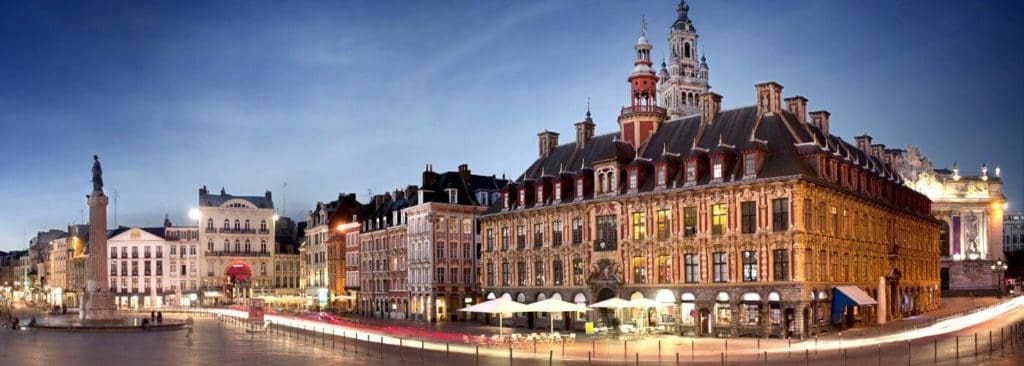
It is the fourth largest city in France and is often overlooked as a place to settle. It is the capital of the Hauts-de-France region in northern France, near the border with Belgium. A cultural hub and bustling university city today, it was once an important merchant center of French Flanders, and many Flemish influences remain.
The historic center, Vieux Lille, is characterized by 17th-century brick townhouses, cobbled pedestrian streets, and the large central square, Grand Place. There is a lot more to the city than meets the eye.
The nicest people in France!
As the capital of French Flanders, the city has its own unique identity. The beverage of choice here is beer, not wine. The architecture is classical Flemish more than it is French and the locals are known for being among the friendliest in the country.
A short 80 minutes away from London by train, an hour from Paris and 35 minutes from Brussels, Lille boasts its own unique character thanks to a Flemish, Burgundian, and Spanish past that reveals itself through red-brick buildings, medieval structures, and cobblestone streets. One of the city’s biggest claims to fame? Hosting the largest open-air flea market in Europe every fall.
The year 2018 also marked Lille’s 350th anniversary as a French city following years of Spanish rule. Here are some reasons why you will want to add Lille to your France itinerary.

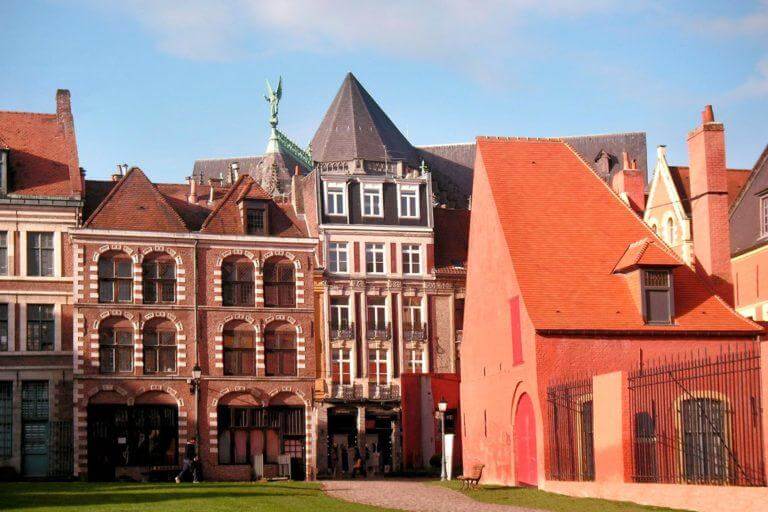
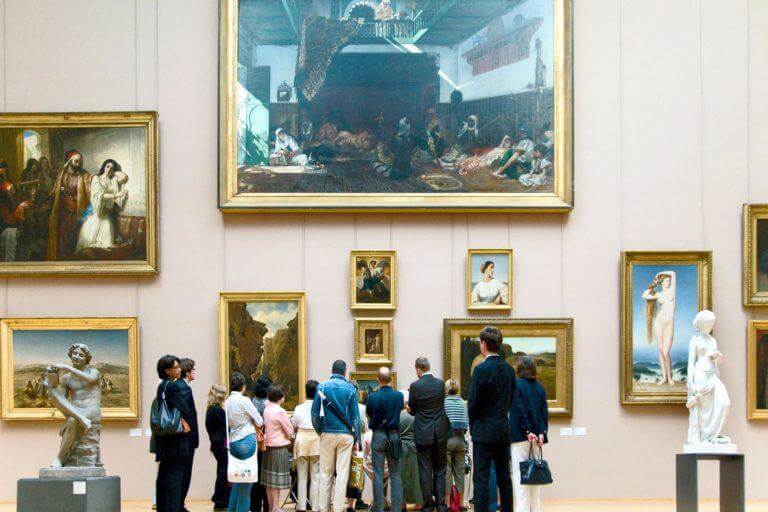
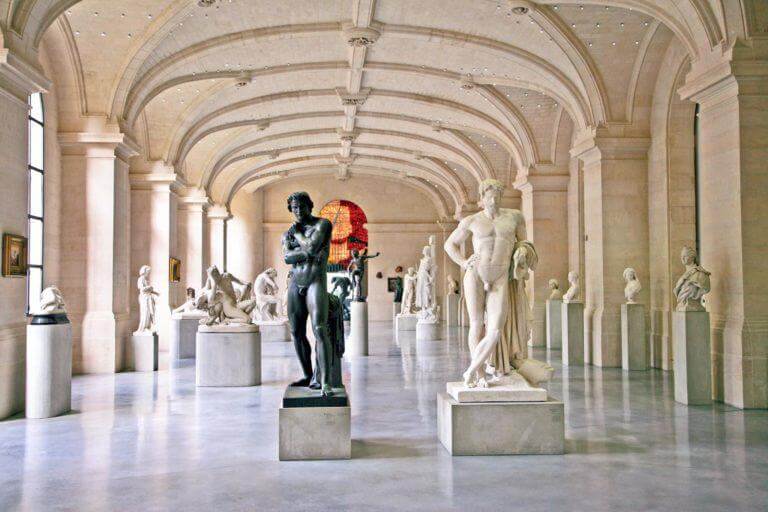
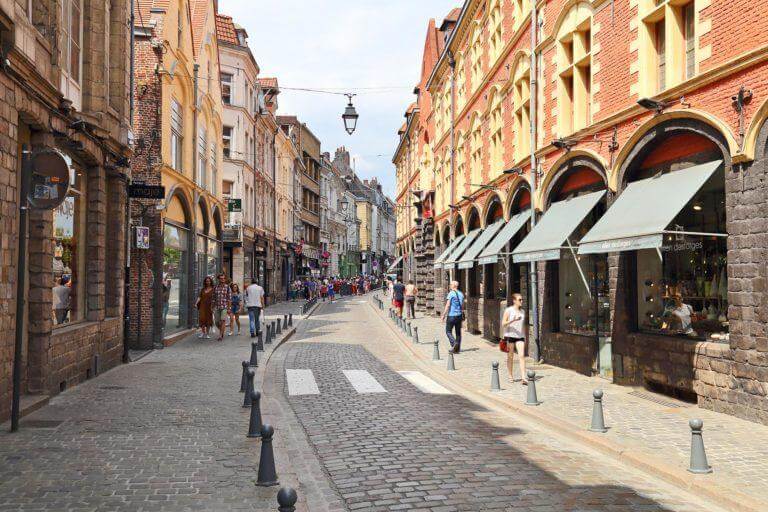
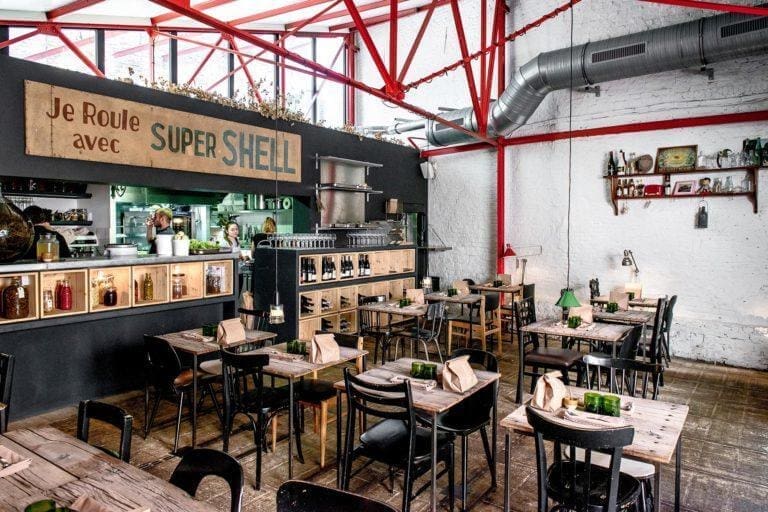
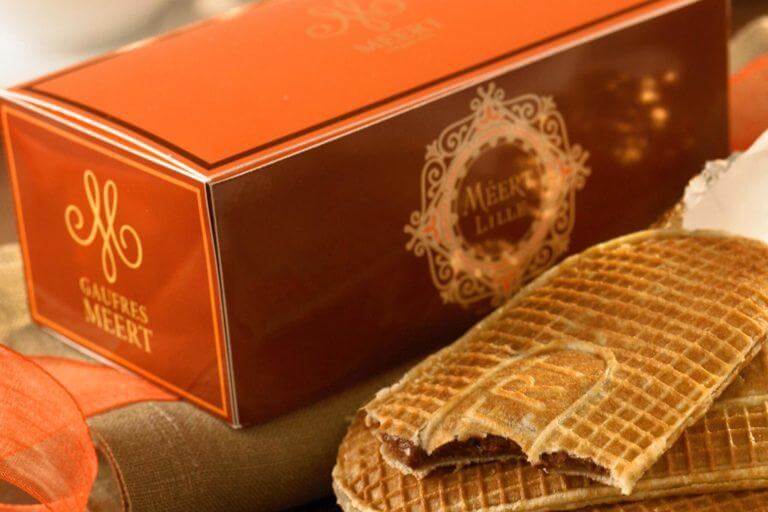
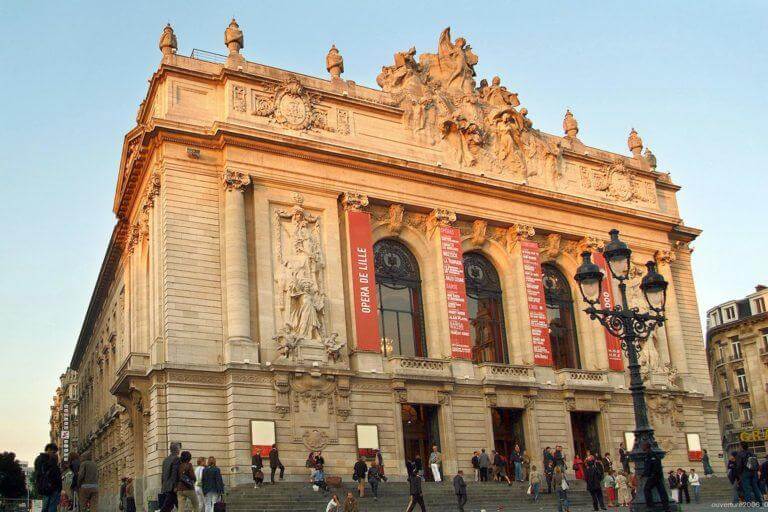
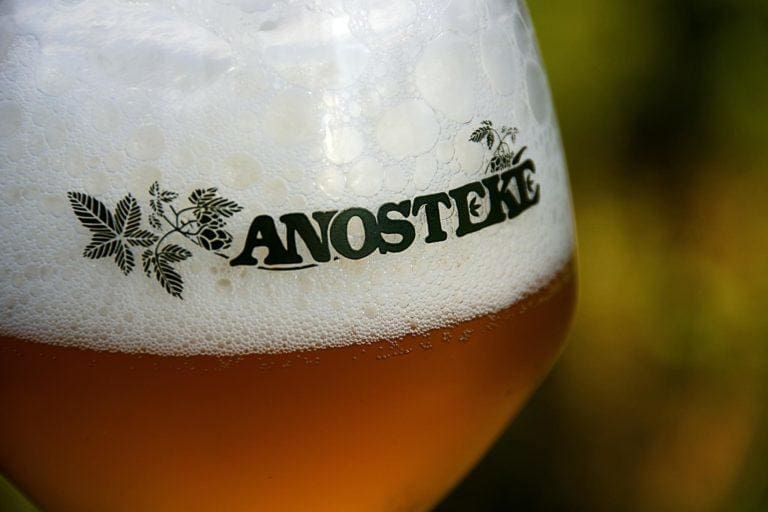
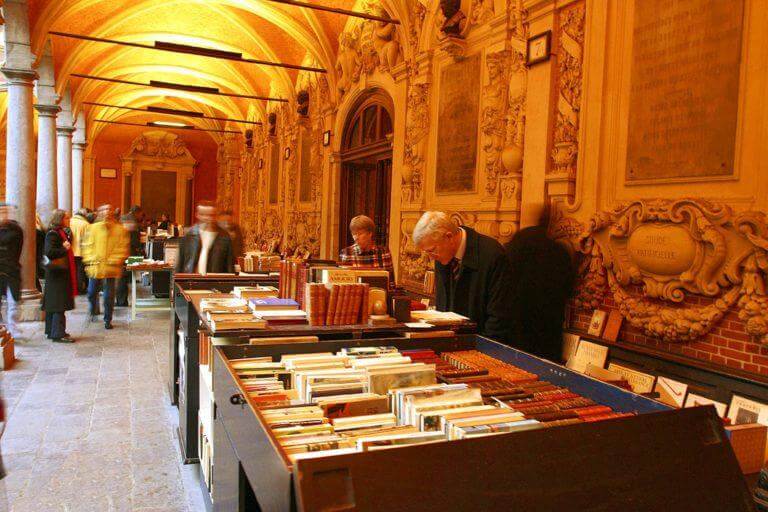
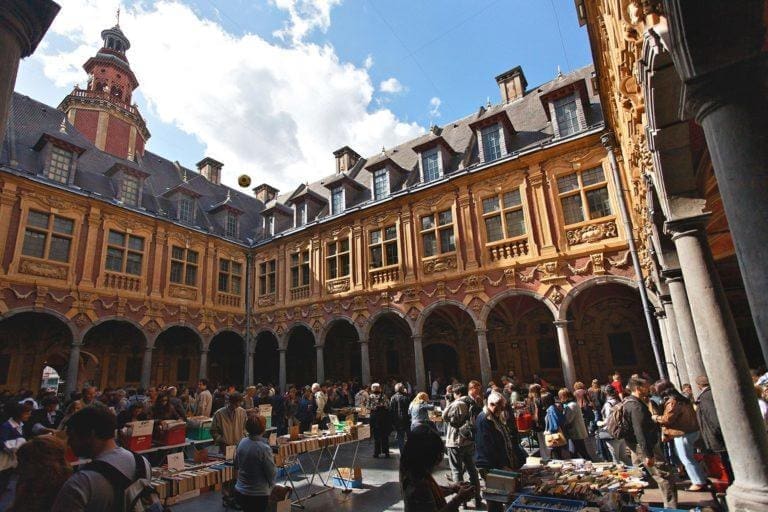
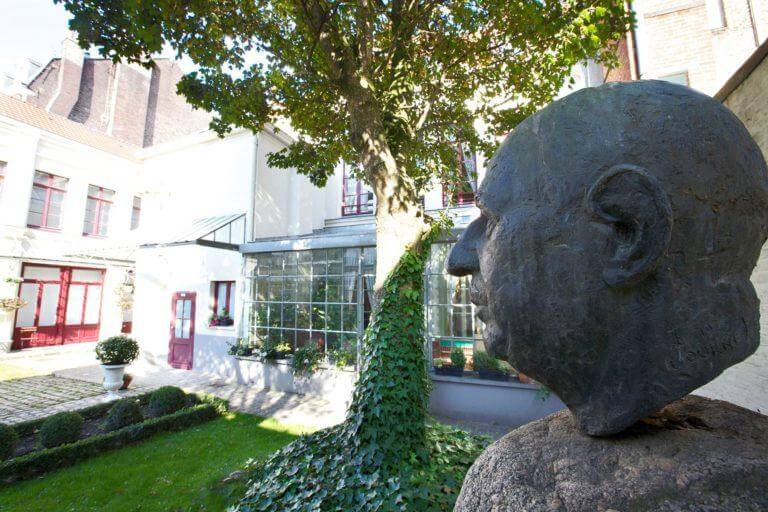
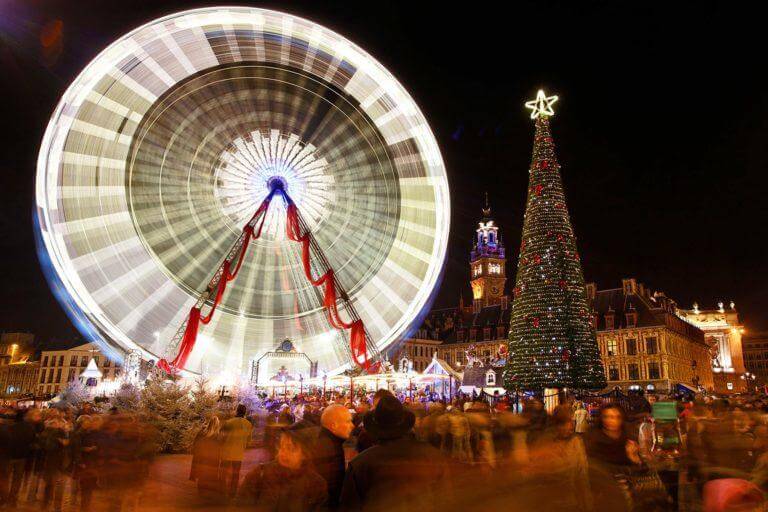
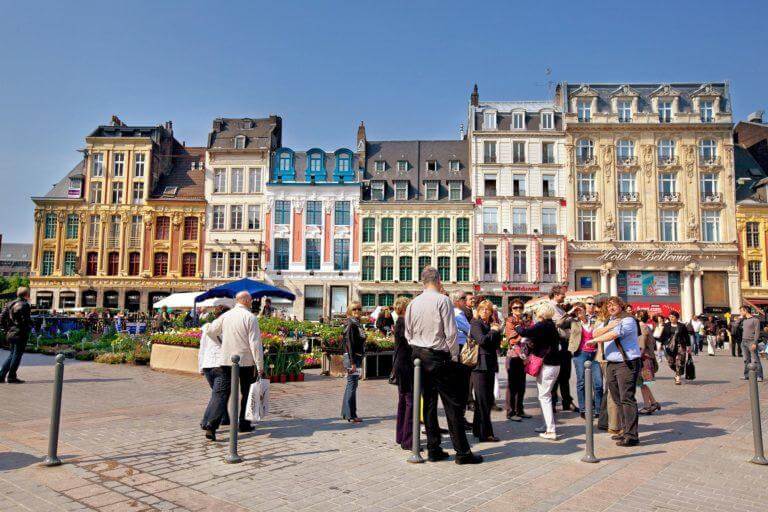
Reasons to Visit
Descriptions of photos above
- Biggest Outdoor Flee Market in Europe
- For Architecture Lovers
- For Art Lovers
- Fashion and Shopping
- French Cuisine
- Pastries and Desserts
- The Opera
- For Beer Lovers
- For Book Lovers
- For History Buffs
- For the Christmas Spirit
- For the Locals
On the first weekend of September, the city of Lille transforms 100 kilometers of streetscapes into an open-air market, where old, forgotten, and antique relics of the past are exhumed out into the open, waiting to be given a new life. The Braderie de Lille is an annual tradition that can be traced back to the 12th century and attracts approximately two million visitors every year. Serious treasure hunters go to snap up everything from fairy-tale spinning wheels, gas masks, rusting trumpets, to vintage lace and teapots, while others go to people-watch and take a nostalgic stroll down memory lane. For example, think rotary phones and cassette tapes. After pounding the pavement, be sure to hit up a restaurant for Moules Frites: In another Lille tradition, local restaurants engage in a friendly competition to see who can build the biggest mountain of discarded mussel shells outside their restaurant. It is quite the sight.
Get your phones or cameras out: Vieux or Old Lille is the city’s most photograph and Instagram-worthy neighborhood, with its narrow, cobblestoned streets; Flemish-style, red-brick buildings; medieval structures; and cheerful, brightly painted facades. Architecture and history buffs may also be interested in guided walking tours of the old town, which start at the tourism office and last two hours. Tours are held every Saturday at 10:15 am.
Paris does not have a monopoly on fine art. With a permanent art collection that spans more than 236,000 square feet, Lille’s Palais des Beaux-Arts is the second largest general-interest museum in France after the Louvre. The collection includes works from master artists like Claude Monet, Auguste Rodin, Eugene Delacroix, Pablo Picasso, and Flemish painter Peter Paul Rubens. Less into art history, more a fan of modern art? Head over to Le Tripostal, converted from a mail sorting facility into a creative and cultural space that hosts temporary art and photo exhibits as well as performances and festivals. The Gare Saint Sauveur was also resurrected from a freight station into an art-house which likewise features temporary, contemporary art exhibits, concerts, an urban farm, and free film screenings for part of the year.
As France’s leading center for clothing and technical textiles, Lille has become a hub among up-and-coming designers for whom Paris is prohibitively expensive. Over the last decade, a dedicated fashion district called the Maison de Mode (Fashion House) in the south pocket of the city has been fostering the talents of young jewelry, fashion, and handbag designers with the support of French fashion designer Agnes B. The former movie theater houses seven studio boutiques where visitors can purchase a one-of-a-kind dress, ring, bowtie, or handbag from a young French designer. Old Lille is another popular shopping destination, where cobblestoned streets are lined with luxury boutiques, antique shops, and design stores.
For a contemporary take on traditional Flemish cuisine, book a table at Bloempot, a trendy restaurant managed by local celebrity chef Florent Ladeyn who rose to fame thanks to being runner-up in the French version of “Top Chef” in 2013. The rotating menu features simple but elegant dishes made with locally sourced, sustainable, and organic ingredients. Dishes like Dunkerque cod served with potato puree, leeks, sea lettuce, and hollandaise sauce; mackerel with cucumber and dill; and even a “beer tart”. For a more gastronomic dining experience, there’s also La Table at the five-star Clarance Hotel, the only Lille restaurant to hold a Michelin star. Menus change weekly, and likewise highlight local, seasonal ingredients, including herbs plucked from the hotel’s own garden.
The dazzling crystal chandelier suspended from the ceiling and long line of customers snaking outside the boutique should tip you off to the location of one of Lille’s most successful pastry shops, Aux Merveilles de Fred (The Marvels of Fred). Their specialty? A light, airy, fairy-tale meringue covered in whipped chantilly cream and chocolate shavings, a traditional pastry of Northern France. Another local institution is Meert’s, a restaurant and tea salon with a history that can be traced back to 1761. Visitors go to sample their signature Meert waffles, a recipe that hasn’t changed for more than a century. Unlike Belgian waffles, Meert waffles are thin, almost wafer-like, and stuffed by hand with a sweet Madagascar vanilla-flavored butter.
The 20th-century building is an opulent, neoclassic, Italian-style opera house that stages three operas a year, in addition to contemporary dance performances, concerts, and musicals. Ticket prices for top-notch performances at the Opera de Lille are also a fraction of the price of operas staged in the French capital, leaving more euros for an extra beer or pastry.
Along with its Flemish roots, another characteristic that sets Lille apart from the rest of France is the city’s dynamic beer culture, both in production and consumption. Beers from the region are typically lagers and ambers, contain more alcohol, and are more robust in flavor than their standard counterparts.
One of the region’s specialties, carbonnade flamande is a beef stew, brewed in beer. Naturally, the beverage of choice to accompany the meal is a local lager or amber. In 2016, a Lillois brewery took top honors at the World Beer Awards in the UK in the category of Biere de Garde for their Anosteke range. Biere de Garde, also known as farmhouse beer, is typically blond or deep copper in color and was originally aged or matured in the cellar before consumption. The Anosteke Saison was described as hazy gold, light, fresh, and spicy.
Perhaps there is no better setting for a second-hand bookshop than the courtyard of the Vieille Bourse or Old Stock Exchange, widely accepted as the most beautiful monument in the city. Built in the 17th century, the building is made up of 24 houses that form a square around an inner courtyard. Every Tuesday and Sunday afternoon, the courtyard turns into an open-air, second-hand bookshop. Visitors may also happen upon chess players on a dry afternoon as well. On Sunday, summer evenings between July and September, the courtyard becomes an open-air stage for tango dancers.
Most visitors to France are familiar with the name Charles de Gaulle, less for his significance as a national hero, and more for the Paris airport that bears his name and initials – CDG. But de Gaulle is a giant in French history, having led the French resistance against Nazi Germany in World War II as a general. De Gaulle would eventually become the architect of the Fifth Republic, the current system of government in France. He also served as President of France between 1959-1969. You can see why Lille would be proud of their homegrown hero and preserve the house at 9 Princess Street where de Gaulle was born on November 22, 1890. The house belonged to his grandparents and has been restored to exhibit a typical 19th century home of Northern France. It features family keepsakes from de Gaulle’s childhood, including cradle and christening robe.
Since 1989, the city of Lille has turned up the dial on the holiday spirit with a month-long Christmas market that features 90 stalls selling crafts, toys, gift ideas, mulled wine, and rib-sticking comfort foods like tartiflette (made of potatoes, cheese, and bacon lardons), waffles, and crepes. Every day at 4 pm, the wintry darkness is obliterated and the illuminations light up the city streets. The centerpiece of the market is a 59-foot Christmas tree placed in the main square. Another popular, recurring feature of the yearly market is the Ferris wheel, a festive attraction that offers riders panoramic views of the city, twinkling underneath their feet. This year, the Christmas market opens November 26 and runs until December 30, 2021.
While Parisians suffer a widespread reputation for being surly and rude – “some might say rightly, others may say unfairly” it’s a different reputation entirely, just an hour outside the capital. In fact, while Lillois are generally known for being friendly and warm, when asked in an unscientific 2017 survey by French listicle site Topito where in France people are the nicest, Lille emerged the overall winner. Spend a bit of time in the city and Northern France (specifically the Hauts-de-France region) and you’ll also hear the locals referred to as ch’tis, slang that denotes both Northerners and their distinct French patois. Want to fit in with the locals? Instead of the standard “bonjour”, greet shopkeepers and servers with “J’di bonjour” and they may be more willing to negotiate a good deal or add a few more fries to your plate.
Follow Our Blog
By clicking subscribe, you agree to share your email address with the site owner and Mailchimp to receive marketing, updates, and other emails from the site owner. Use the unsubscribe link in those emails to opt-out at any time.
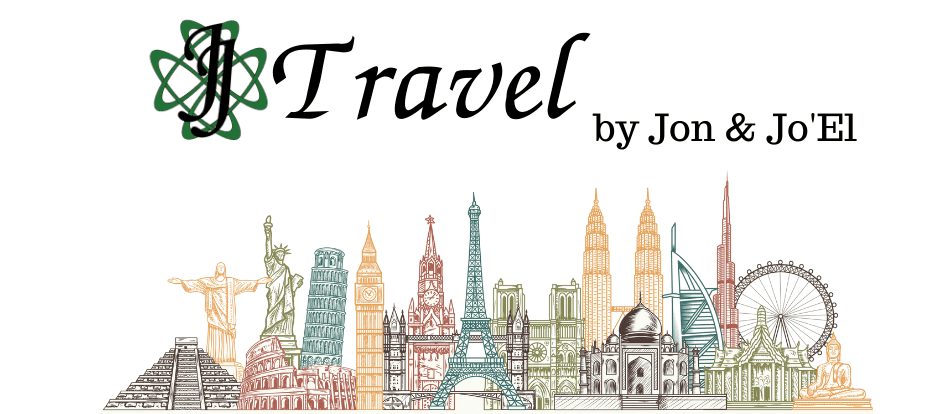
I went to Lille’s darling Christmas Market when I lived in the UK. It’s a place definitely worth visiting!